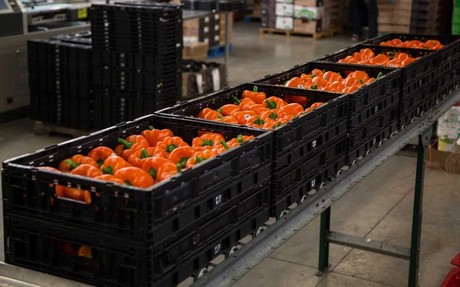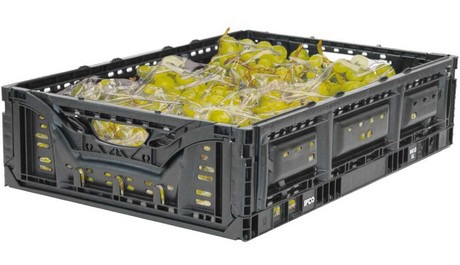IFCO recently announced the appointment of Dan Martin as President, IFCO North America. Martin returned to IFCO after serving as Senior Vice President Sales & Customer Operations at CHEP USA. Prior to that, he was General Manager and Sales Leader at IFCO. He says returning to IFCO after an absence is like coming home, and while a lot has changed over the years, some things haven't.
"IFCO is a diverse company with a fully sustainable business model," Martin said. "Returning to IFCO is like coming home in more ways than one. It's the perfect point in time for me to return and is the convergence of my experience and where the industry is at now. My experience in pooling models at CHEP has been beneficial and its with this experience and knowledge that I move forward at IFCO."
Martin noted that RPCs were a very small part of the IFCO business during his previous time at the company. But now, it has become a significant part of the business and is poised for tremendous growth. "We now manage a pool of $270 Million assets globally and have managed 1.3 - 1.4 Billion shipments in the past year alone. That is RPCs that have been collected, sanitized and returned. The industry is poised for solid growth and in the last year, IFCO achieved global sales growth of 8 percent, topping $1 Billion in revenue for the first time in its existence."

Data points to better margins with RPCs
Martin highlighted the benefits of using RPCs for all users from farmers and packers to retailers and consumers. The first aspect is their rigidity, which provides a greater level of protection for produce, he says. The inherent design means that airflow is also improved. As a result of both of these factors, there is less food waste. Martin cited data received from observations and research that demonstrates the improved margins from using RPCs.
"The RPCs that IFCO has produced are intended to extend the life of shipments compared with single-use packaging through their design," he explained. "Our data has shown it protects produce and lowers costs, with margins of 25 - 55 percent improvement. The lowered cost flows down the chain, benefiting growers and packers when it comes to storage and stacking, retailers with one-touch handling, as well as end consumers who enjoy produce that stays fresher and is better quality."
Networking in global environment provides critical advantage
IFCO is no doubt a very large company, having the most RPCs in use in the world and with customers in over 50 countries. Martin said that it's this scale that contributes to the company's sustainable business. However, he added that it's the people who work there as well as the contacts outside of the company that really help.
"It's our breadth and scale that makes IFCO really stand out," Martin said. "Our experience in RPCs and our network affords us a critical advantage in maintaining our place as one of the largest companies for RPCs in the world. When I think about the product and the people, I perceive we are at an all time high. We also have a solutions mindset, driving the value for our customers beyond the platform."

Automation being implemented
Many companies, especially in Europe and North America, are seeking to lower their costs when it comes to the day to day running of their business. As the world becomes more globalized, this is vital to compete on the global scale. IFCO is no different and has looked to continually innovate. The focus is now on automation, both in the company's own warehouses and in those of their customers. Companies like Amazon have demonstrated that automated warehouses are already here and retailers are showing a great interest when it comes to their own warehouses and how they handle their fresh produce.
Martin shared that IFCO has invested heavily into automation this year. "IFCO has spent more on automation in the past year than in the previous ten," he said. "Our investment into automation is to drive quality and service, as well as provide an assurance of supply to our customers, while keeping costs down."
He continued by saying that RPCs are perfect for automated warehouses. "Automated warehouses are popping up all over the place. We have been working with many of these companies in order to make RPCs the standard. The rigid structure makes them ideal for robotics because they are sturdy and remain in a fixed form. Europe is well ahead of us in North America in this regard, but because IFCO has a strong presence in Europe, we are able to work in a consultative role for companies in North America."
It's not just automation that the company has invested in. With food safety among the most critical measures of companies, IFCO has also developed its own sanitation process. "Food safety is essential and therefore IFCO has developed SmartGuardian. This monitors our wash facilities, giving us immediate control in the cleaning process. There are programmable parameters in areas such as temperature where, if exceeded, alerts the operator or shuts the system down."

Extending innovation from fresh produce to other channels
IFCO provides RPCs for a number of industries aside from fresh produce. According to Martin, the innovation learned through fresh produce is being extended to other parts of the business. "Externally, some of our projects involve extending the innovations from fresh produce to other channels such as meat and eggs."
Home consumer RPCs in the future?
With all the talk and attention on large-scale warehouses, there is also a huge potential for RPC usage in many other areas. For example, IFCO are currently doing several pilots for the foodservice industry and seeing how they can introduce RPCs to this area. Martin also envisions RPCs being utilized by people in their homes, based on the path that retailers are taking when it comes to single-use plastic bags and plastic packaging in general.
"There is plenty of growth happening and a lot more growth to be had," he observed. "Retailers are now strongly pushing RPCs as they realize the benefits of reduced shrink and lower costs. Then there is what we call 'The Last Mile'. With the growth of 'click-and-collect' and curbside pickups, we see a huge potential. Currently, there is no standardized packaging for this burgeoning category. Moreover, many retailers are backing out of the usage of plastic bags so we see a potential for directly serving customers with RPCs. Here, we can develop a return system, a place where customers can return the used RPC for cleaning and re-use."
For more information:
Sean McBride
Tel: +1 (202) 309-3050
smcbride@dsmstrategic.com
www.ifco.com
